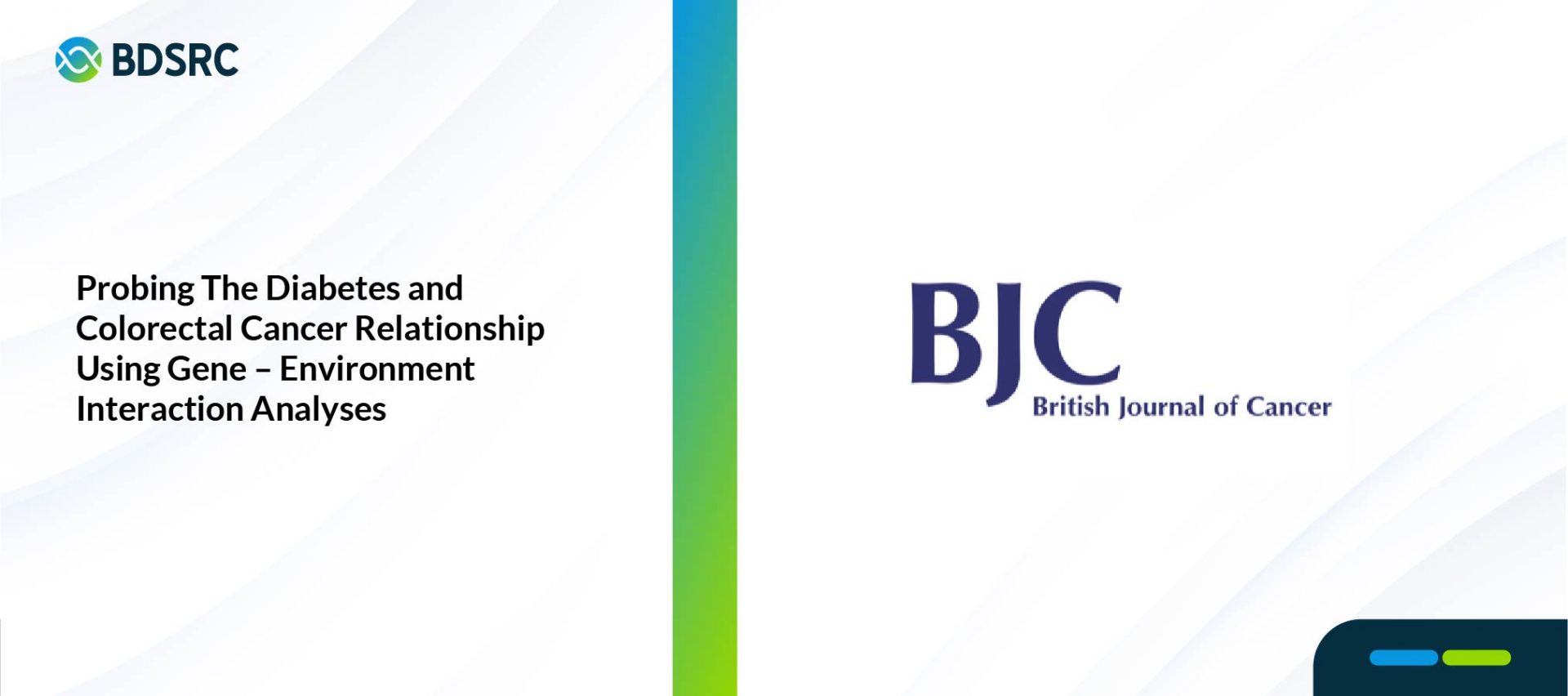Probing The Diabetes and Colorectal Cancer Relationship Using Gene – Environment Interaction Analyses

Diabetes is an established risk factor for colorectal cancer; however, the mechanisms underlying this relationship are not fully understood and the role of genetic variation is unclear. We used data from 3 genetic consortia (CCFR, CORECT, GECCO; 31,318 colorectal cancer cases/41,499 controls) and undertook genome-wide gene-environment interaction analyses with colorectal cancer risk, including interaction tests of genetics(G)xdiabetes and joint testing of Gxdiabetes, G-colorectal cancer association and/or G-diabetes correlation (2,3-degrees of freedom joint tests; d.f.). Based on the joint tests, variant rs3802177 in SLC30A8 (p-value 3-d.f .:5.46×10 ⁻¹¹ ; regulates phosphorylation of the insulin receptor and phosphatidylinositol-3 kinase activity) and rs9526201 in LRCH1 (p-value 2-d.f .:7.84×10 ⁻⁰⁹ ; regulates T cell migration and Natural Killer Cell cytotoxicity) were associated with colorectal cancer. These results suggest that variation in genes related to insulin signalling and immune function may modify the association of diabetes with colorectal cancer and provide novel insights into the biology underlying the diabetes and colorectal cancer relationship.
Authors:
Elom K. Aglago, Andre Kim, Yi Lin, Conghui Qu, Marina Evangelou, Yu Ren, John Morrison, Demetrius Albanes, Volker Arndt, Elizabeth L. Barry, James W. Baurley, Sonja I. Berndt, Stephanie A. Bien, D. Timothy Bishop, Emmanouil Bouras, Hermann Brenner, Daniel D. Buchanan, Arif Budiarto, Robert Carreras-Torres, Graham Casey, Tjeng Wawan Cenggoro, Andrew T. Chan, Jenny Chang-Claude, Xuechen Chen, David V. Conti, Matthew Devall, Virginia Diez-Obrero, Niki Dimou, David Drew, Jane C. Figueiredo, Steven Gallinger, Graham G. Giles, Stephen B. Gruber, Andrea Gsur, Marc J. Gunter, Heather Hampel, Sophia Harlid, Akihisa Hidaka, Tabitha A. Harrison, Michael Hoffmeister, Jeroen R. Huyghe, Mark A. Jenkins, Kristina Jordahl, Amit D. Joshi, Eric S. Kawaguchi, Temitope O. Keku, Anshul Kundaje, Susanna C. Larsson, Loic Le Marchand, Juan Pablo Lewinger, Li Li, Brigid M. Lynch , Bharuno Mahesworo, Marko Mandic, Mireia Obón-Santacana, Victor Moreno, Neil Murphy, Hongmei Nan, Rami Nassir , Polly A. Newcomb, Shuji Ogino, Jennifer Ose, Rish K. Pai, Julie R. Palmer, Nikos Papadimitriou, Bens Pardamean, Anita R. Peoples, Elizabeth A. Platz, John D. Potter, Ross L. Prentice, Gad Rennert, Edward Ruiz-Narvaez, Lori C. Sakoda, Peter C. Scacheri, Stephanie L. Schmit, Robert E. Schoen, Anna Shcherbina, Martha L. Slattery, Mariana C. Stern, Yu-Ru Su, Catherine M. Tangen, Stephen N. Thibodeau, Duncan C. Thomas, Yu Tian, Cornelia M. Ulrich, Franzel J.B. van Duijnhoven, Bethany Van Guelpen, Kala Visvanathan, Pavel Vodicka, Jun Wang, Emily White, Alicja Wolk, Michael O. Woods, Anna H. Wu, Natalia Zemlianskaia, Li Hsu, W. James Gauderman, Ulrike Peters, Konstantinos K. Tsilidis, Peter T. Campbell, Hsu L.,
British Journal of Cancer
